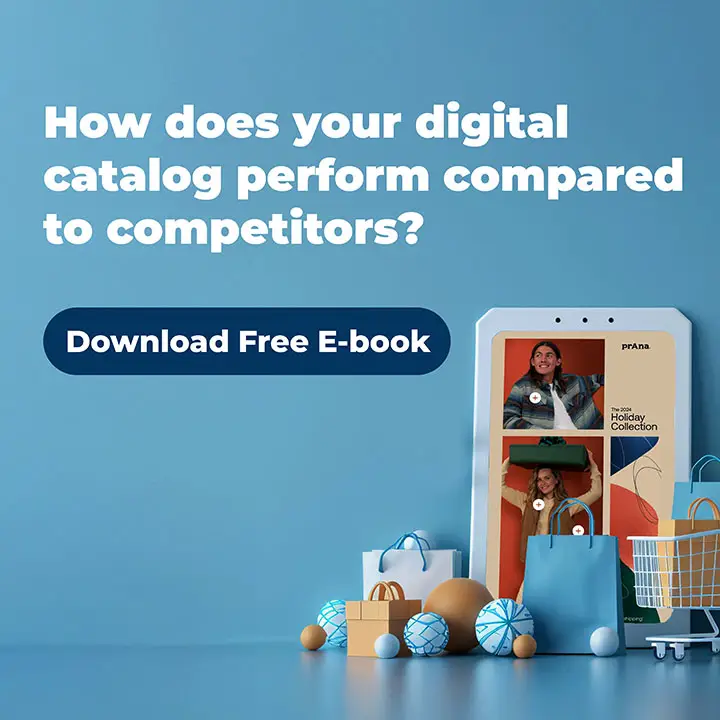As eCommerce markets continue to expand, the waste and emissions resulting from brand and retailer activity are now very much under the microscope. A growing number of consumers, activists, and organizations demand that online retailers play their part in toeing the line towards more sustainable economies, which helps meet 2050 net-zero carbon targets.
More paper, CO2, plastic, and packaging waste has inevitably come hand-in-hand with eCommerce growth. And for brands that heavily rely upon their print publications to increase sales, switching from print to digital is a far more eco-friendly way of reaching consumers who are browsing online and who want better discovery commerce experiences.
This post gives you an overview of how discovery commerce has changed the way consumers shop online. We look at the latest data on sustainability and why it makes sense to transition from print to digital.
Digital discovery commerce experiences don’t waste paper
For decades, retailers and brands have relied on print publications to inspire customers and sell their products. But in 2020, several global brands announced they would stop printing their paper-based catalogs, with retailers citing increased online competition and sustainability as reasons for doing so.
Shopping online has come a long way from using search to discover new brands and products. Consumers now want an omnichannel experience where their shopping habits, preferences, and expectations for customer service are the same wherever and whenever they’re shopping.
Most brands design their webshops to target shoppers who know what they want. But shoppers who don’t know what they want — roughly 50% — demand better discovery commerce experiences, prompting social media giants like Meta and TikTok to build discovery commerce tools and capabilities for brands.
The consumer shift towards digital shopping is very likely to remain after the pandemic, with 75% of shoppers having tried a new shopping behavior since the inception of the pandemic and who said they intend to continue these methods after.

Recently, it’s become significantly more expensive to print on paper. And brands that still rely on a print catalog for discovery and inspiration could be churning out millions of tonnes of paper-based catalogs every year. For many, the situation is no longer sustainable — and a growing number of consumers demand products from brands with sustainable business practices (more on this below).

Our obsession with paper is not sustainable
Our obsession with paper has resulted in deforestation and the destruction of millions of hectares of forests worldwide. And a lot of the paper we produce ends up in landfill sites — which release CO2 and methane gas into the atmosphere.
Here are some facts about paper and paper waste, taken from TheWorldCounts, which predicts the rainforest won’t exist in about 77 years if we carry on the way we are:
- 93% of paper comes from trees.
- 50% of business waste is composed of paper.
- Recycling 1 ton of paper saves around 682.5 gallons of oil, 26,500 liters of water, and 17 trees.
- US offices use 12.1 trillion sheets of paper a year.
- Paper accounts for 25% of landfill waste and 33% of municipal waste.
TheWorldCount adds that 42% of global wood harvest is used to make paper and makes quite a convincing argument when it asks the question: “is it worth it to cut down our life-saving trees for this product?”
We’ll let you decide for yourselves.
The amount of waste and CO2 produced by brands that sell online has become a significant cause for concern
Paper waste and the amount that goes into landfill sites as a direct result of consumption and eCommerce trade are just the tip of the iceberg for CO2 emissions and adverse environmental effects.
The convenience that eCommerce provides for consumers comes with a severe cost to the environment: research published by Statista found that commercial road transport and shipping alone account for 30 and 10 percent of transportation CO2 emissions worldwide, respectively.
There’s a whole plethora of environmental issues that online shopping presents: the same report from Statista adds that the number of orders purchased and returned to retailers account for one-quarter of carbon emissions of the global eCommerce industry. And a large amount of these orders aren’t put back into the retail value chain — instead, they end up in landfill sites because returning and repackaging them isn’t profitable.
The same report from Statista also states, “apparel seems to be the most impactful on the environment. In 2020, a European study revealed that fashion items emitted the highest amount of CO2, although with differences among countries.”
Then there’s the major issue of packaging waste: the same report from Statista says, “both international eCommerce giants and smaller players are required to tackle the packaging issue. Globally, about 900 million kilograms of plastic packaging waste is produced in the eCommerce industry per year.”
We anticipate that this number will only keep growing as eCommerce sales volumes continue to grow.
Finally, the report concludes that consumers are more concerned about the negative environmental impacts of overpackaging than companies themselves. They demand that brands be more responsible when it comes to sustainability.
Consumers demand that brands become more sustainable
In light of the profoundly concerning facts and findings published by various organizations — and what’s now getting the attention of brands — is that a considerable amount and growing number of consumers believe that retailers need to take responsibility for reducing CO2 emissions and waste from eCommerce trade.
In particular, millennial consumers, whose spending power in 2020 was estimated to be around $2.5 trillion annually, are demanding that retailers become more eco-friendly and more sustainable. In 2017, US-based sustainability marketing consultancy firm, The Shelton Group, found that 70% of millennials said that a company’s environmental focus influences their purchase decisions — that’s almost three-quarters of all millennial consumers!
And in Europe, a study on consumer attitudes towards sustainability for online trade was carried out by the Cologne Entrepreneurial club in Germany. They found that the sustainability measures of online shops are of great importance and that webshops that adopted sustainability into their working practices were of great value to them.
Another report published by Statista found that German consumers are willing to pay more for sustainable products; and in an article published by Byrd, they report that 86% of Germans prefer environmentally-friendly shipping; and more than 1 in 5 Germans is willing to pay more for shipping if it helps protect the environment.
There’s an overwhelming amount of evidence suggesting that consumers worldwide demand more sustainable and environmentally-friendly business practices. These demands incentivize brands to adapt if they want to win more business and become market leaders.
Publitas’ mission: to empower and inspire brands to transition from print to digital
From the above discussion and statistics about what consumers are demanding, it’s clear that if you’re a retailer or brand, to win more customers, you need to provide better eCommerce discovery experiences — and show them that you take sustainability seriously.
- Making the web more sustainable with zero-carbon websites;
- Reducing unnecessary packaging;
- Switching to biodegradable alternatives;
- Reducing the amount of plastic;
- Eco-friendly shipping.
There are many ways eCommerce brands can reduce the amount of waste and carbon they produce and show that they are meeting targets.
And particularly for brands that mail out their paper-based catalogs every year, switching to a digital catalog will significantly reduce the amount of paper your organization wastes. It’ll also help save trees and offset emissions to produce and print paper-based catalogs.
Here at Publitas, we empower brands to transition from print to digital and provide your shoppers with an engaging, personalized discovery experience that shows your customers that you’re taking sustainability seriously.
Interested? Feel free to contact us, or sign up for our free 14-day trial here.


